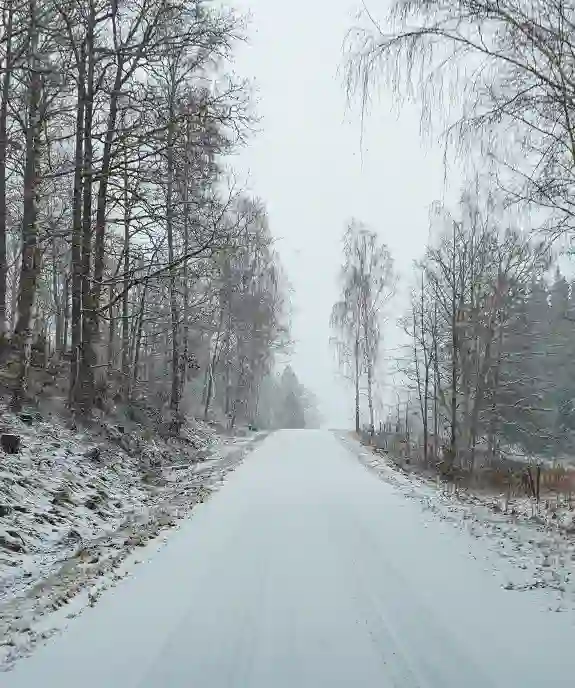- Need Any Help: +1 647-760-5505 or
- info@trubicars.ca

Manitoba’s winters are known for their beauty, but they can also be unforgiving, with freezing temperatures and heavy snowfall creating challenging driving conditions. As a responsible driver, it’s essential to be prepared for winter’s wrath and ensure your safety on the road. In this Trubicars blog, we’ll provide you with valuable tips and strategies for winter driving in Manitoba’s challenging climate. Whether you’re a seasoned driver or new to the province, these tips will help you navigate the winter roads with confidence.
Investing in a good set of winter tires is the first step in preparing your vehicle for Manitoba’s winter roads. Winter tires are designed to provide better traction on snow and ice, significantly improving your vehicle’s handling in cold conditions. Ensure your winter tires are in good condition and have adequate tread depth to tackle the challenges of winter driving.
Reducing your speed during winter is crucial. Slowing down gives you more time to react to unexpected situations and reduces the risk of skidding. Additionally, increase your following distance from the vehicle in front of you to allow for safe braking and prevent rear-end collisions.
Before hitting the road, take the time to clear all snow and ice from your vehicle. This includes not only your windows and mirrors but also your roof and headlights. Snow blowing from your roof can obstruct your view and pose a hazard to other drivers.
In case you find yourself stranded due to weather conditions or an accident, having an emergency kit in your vehicle is essential. Your kit should include items such as a warm blanket, flashlight, extra clothing, non-perishable snacks, and a fully charged cell phone.
Abrupt movements can lead to loss of control on slippery roads. Use gentle and gradual movements when braking and steering. If your vehicle begins to skid, steer in the direction you want to go and avoid slamming on the brakes.
Black ice, which is often invisible, can form on road surfaces and make driving extremely hazardous. Be especially cautious on bridges, overpasses, and shaded areas, as these are more prone to black ice. Reduce your speed and proceed with caution when you suspect icy conditions.
Monitor weather forecasts and road conditions before embarking on a winter journey. Stay informed about road closures, advisories, and travel restrictions. It’s always better to delay your trip if conditions are severe.
Ensure your vehicle is ready for winter by having it serviced and winterized. This includes checking the battery, engine, heating system, and fluid levels. A well-maintained vehicle is less likely to leave you stranded in the cold.
Visibility can be severely reduced during winter storms. Use your headlights and taillights to make your vehicle more visible to other drivers. Keep your headlights on low beam to avoid blinding drivers in the opposite direction with snow glare.
If you’re traveling a longer distance, plan your route and inform someone of your travel plans. Stick to well-traveled roads whenever possible and avoid shortcuts that may not be maintained during winter.
In addition to your emergency kit, consider carrying supplies like a small shovel, ice scraper, sand or kitty litter for traction, and a windshield washer fluid designed for cold temperatures.
Understanding your vehicle’s limitations in winter conditions is crucial. If you have a rear-wheel-drive vehicle, for example, it may not handle as well as a four-wheel-drive or all-wheel-drive vehicle in snowy conditions.
Driving in heavy snowfall can be unnerving, but it’s essential to stay calm. Reduce your speed, use your low-beam headlights, and keep a safe distance from other vehicles. If conditions become too hazardous, find a safe place to pull over and wait for the storm to pass.
Winter driving in Manitoba’s challenging climate requires preparation, caution, and a commitment to safety. By following these Trubicars tips and strategies, you can significantly reduce the risks associated with winter driving and ensure a safer journey for yourself and others on the road. Remember, winter driving demands patience and a heightened sense of awareness. Be proactive, stay informed, and prioritize safety to conquer Manitoba’s winter roads with confidence. Safe travels!

 February 13, 2024 by
February 13, 2024 by Reema Sharma
Reema Sharma
 January 17, 2024 by
January 17, 2024 by Trubicars
Trubicars
 January 17, 2024 by
January 17, 2024 by Trubicars
Trubicars
Once you acquire the knowledge provided in
those tests, you are ready to pass the
test,
the first time.
